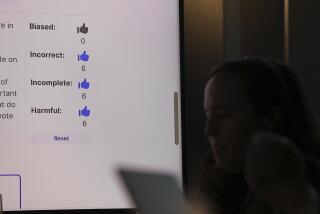Bot passes Turing Test; judges think it’s a 13-year-old boy
- Share via
For the first time, a computer program has officially passed the Turing Test, which measures a machine’s ability to think for itself -- at least under the standards set by a competition in Britain.
The achievement, being hailed as a milestone for the field of artificial intelligence, came Saturday in London at a competition organized by the University of Reading involving five computer programs. Each was tasked with persuading at least 30% of judges into mistaking it for a human. The winner, a program named Eugene Goostman tricked 33% of the judges into believing it was a 13-year-old non-native-English-speaking Ukrainian boy.
As part of the competition, 30 judges each held conversations with five computer programs and five humans. During each conversation, the judge had to determine whether he or she was speaking with a human or machine.
The Turing Test was originally proposed by British computer scientist Alan Turing in a paper written in 1950, in which he wrote “I propose to consider the question, ‘Can machines think?’ ”
The Eugene program was created by a team of half a dozen software engineers who’ve been trying to beat the Turing Test since 2001.
“We’re delighted,” said John Denning, one of the team members. “We think that this is a new chapter for artificial intelligence that’s just been waiting to happen. I hope that people can see the possibilities that are out there.”
Denning said the team is made up of people who hold day jobs with tech companies and spent their free time working on the contest entrant. Denning’s day job is with WholesaleChange.com, a startup he founded with friends that aims to replace customer-service representatives with artificially intelligent chat-bots that will be capable of helping customers pick Medicare plans as well as their doctors and hospitals.
The winning entrant’s accomplishments suggest that people may soon be able to hold conversations with computers that feel real.
“Siri is just awful. You can’t have a conversation with Siri,” Denning said, referring to the voice assistant for Apple’s iPhone and iPad. “People should be able to expect more. This shows it’s possible.”







